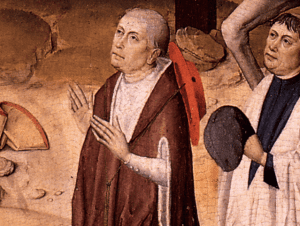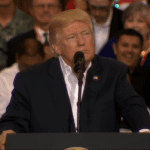
In the fifteenth century, Pope Eugene IV faced many similar complaints and criticisms of the Pope that Pope Francis receives today. Nicholas of Cusa was known as the “Heracles of the Eugenists” because of the effort he went to defend Pope Eugene IV from these accusations, working, as he could, to repair any schism that came as a result of the bad faith of Eugene’s critics.
Nicholas faced many groups criticizing Catholic practices and doctrines of his day as being drastically changed from earlier times, such as the complaints given by the Bohemians (followers of Jan Hus), saying that the earlier practice of giving communion in both kinds, started by Christ himself, should never have been discontinued. Then there were the complaints given by conciliarists from the Council of Basel against Pope Eugene IV, saying that Pope Eugene was a heretic who had no power or authority to dismiss the Council of Basel for his own Council in Florence.
Nicholas pointed out how the Holy Spirit provided authority to the church to understand and interpret doctrine and establish practices as necessary, even if they differed from previous practices and sometimes seemed to contradict them:
Hence, even if today there is an interpretation by the Church of the same Gospel command differing from that of former times, nevertheless, the understanding now currently in use for the rule of the Church was inspired as befitting the times and should be accepted as the way of salvation. [1]
This was how he dealt with many of the complaints given against Pope Eugene IV. One of the examples he gave was in the way baptism itself had changed. In his Dialogue with the Amedeists (those who went against Eugene IV at Basel and elected Amadeus VIII as an antipope), he mentioned how “Once the whole Church had one form of baptism according to which all were saved; after this time another was introduced, and at that point, if someone were baptized according to the old rite, he was not saved.”[2] Likewise, he mentioned how the discipline of marriage changed as new rules concerning consanguinity were established, so that those who were once properly married at one time and place would be separated from their marriage and capable of remarrying at another time and place (in saying this, Nicholas demonstrated Catholicism can and did have differing rules in regard to marriage and remarriage, which those who study the history of matrimony should not find surprising).[3]
Thus, in his debate with the Bohemians and with the Amedeists, Nicholas found he had to give similar kinds of replies: the authority of the Pope, the authority of the church, rested on the Holy Spirit, who, though not forcing the decisions and actions of the leaders of the church, helped inspire them so as to give the teachings and disciplines for their particular circumstance. Nicholas understood there would be changes in both, because humanity was finding its social context constantly changing. This was not to say that there was no core which connected all the teachings together, but he understood the incomprehensible nature of that truth which allowed for a variety of expressions and presentations of it according to the needs of the people being addressed. It was the Holy Spirit guiding the church, in the midst of all its problems, which made sure the church would remain the vessel for salvation, pointing the way to what was needed. Those who wanted simple answers, those who thought there was only one way to explain or do things, could try to create the church in their own image, but they will fail because whatever they would impose would itself be far from the truth itself.
What makes Nicholas’ writings extremely relevant today is how Nicholas of Cusa had to deal with complaints against Pope Eugene IV which are similar to the gossip and slander raised against Pope Francis today. Just like in his times, malice combined with calumny and falsehood are being used to create gossip which was spread far and wide against the Pope, leading many to be confused. Various so-called Catholic sources have been undermining Pope Francis from the beginning, and slowly, they have been able to create new accusations, new claims against the Pope. Often, they combine a false vision of Catholic doctrine with a poor interpretation of Pope Francis’ words in order to declare him a heretic, suggesting, therefore, he really is not the Pope and so can be and should be disobeyed. This is exactly the kind of reactionary Nicholas of Cusa encountered with the Amedeists, and in his text, “To the Diet of Frankfurt,” he made it clear: his critics predetermined Eugene was a heretic and to do so, they looked to his actions to prove it (by claiming he did not have the authority to disband or translate a council):
It is the custom of the Amedeists to use fictions shamelessly and in every imaginable way in order to give color to their wicked acts. Hence they say: it cannot be denied that one accused as a heretic cuts himself off from the Church, citing [Gratian] C.1q.1 c. [Si quis c. 70]:” If anyone should depart from the Church through heretical presumption, he has condemned himself by the very act.” They also cite [idem] C.4 q.5 c.1, C.24. q.1 cc.1,2 and 3. But [they argue] Eugenius is a heretic. Therefore all that is objected against their trial is profitless. They seek, however, to prove the primary premise from their confected “three truths:” the translation of the council, from the degree which begins Moses, and from the bull they claim was sent to the University of Toulouse.[4]
But, as Nicholas pointed out, even if his action was wrong, it did not make him a heretic; if mortal sins alone made someone a heretic, who would remain in the church?
They call our lord a heretic because he translated the council. Even men of very little sense would not use that argument. It is posited that the pope had performed a forbidden act. How can one arrive at the conclusion of heresy in faith and rational judgment from a sinful act? If everyone who transgresses a prohibition should be accused of heresy on the grounds that he has held wrong opinions about the authority of the one who issued the prohibition, there will be no mortal sins without heresy.[5]
Mortal sin, to be sure, does not remove a person from the office of the priesthood: to think it would do so is the fault of the Donatists. Obviously, some actions, some sins, could be and should be seen as grave violations that someone who commits them should be and can be laicized, that differs from what many critics of Pope Eugene IV (and, likewise, Pope Francis) have suggested as they tried to find ways to automatically remove a Pope they dislike from the papacy.
History often repeats itself, though, of course, in the repetition, it often goes from tragedy to farce. This is exactly what we see today in the complaints and criticisms issued against Pope Francis. It is clear his critics have held an ideological bias against him from the start because he challenges them to radically follow Christ over and against their ideologies. They do so, imitating the past, but now it is all farce. The same people who accuse anyone who defends Pope Francis as being “ultramontanists” were themselves ultramontanists under St. John Paul II and Benedict XVI; they who complain about the Pope being a “dictator” want a dictator Pope to excommunicate their ideological opponents; they who complain about Protestants and Orthodox for their rejection of papal authority reject papal authority; those who demand the church not change its ways are extremely modernist in their understanding of the church and demand it to change its doctrines to meet their ideology (which can be seen in their rejection of Catholic Social Doctrine).
Nicholas of Cusa understood the problem which lay behind his opponents was presumption :“Certainly in this lies the beginning of all presumption: when individuals judge their own understanding of divine commands to be more conformed to the divine will than that of the universal Church.” [6] This remains the problem which lies before us today with critics of Pope Francis. Their list of complaints is ridiculous. They misrepresent Francis and his teachings and actions to their own demise. This is not to say people can’t have differing opinions with him. It is what they do with those differences, and how they handle them, and treat Francis as a result of that, which is indicative of the problem at hand. If we see someone echoing false narratives about Francis, using them to undermine the papacy and the good that Francis is trying to achieve, we see those working against the church, and with it, the guidance of the Holy Spirit in this day and age.
[1] Nicholas of Cusa, “To the Bohemians” in Nichola of Cusa: Writing on Church and Reform. Trans. Thomas M. Izbicki (Cambridge: Harvard University Press, 2008), 23.
[2] Nicholas of Cusa, “Dialogue Against The Amedeists” in Nichola of Cusa: Writing on Church and Reform. Trans. Thomas M. Izbicki (Cambridge: Harvard University Press, 2008), 317. In his works, he mentions how some were baptized solely in the name of Christ, which was once shown to be acceptable, but later all baptism had to be done in the name of the Father, Son and Holy Spirit.
[3] See Nicholas of Cusa, “To the Bohemians,” 31.
[4] Nicholas of Cusa, “To the Diet of Frankfurt” in Nichola of Cusa: Writing on Church and Reform. Trans. Thomas M. Izbicki (Cambridge: Harvard University Press, 2008), 241.
[5] Nicholas of Cusa, “To the Diet of Frankfurt,” 243-5.
[6] Nicholas of Cusa, “To the Bohemians,” 17.
Stay in touch! Like A Little Bit of Nothing on Facebook.
If you have liked what you read, please consider sharing it with your friends and family!













